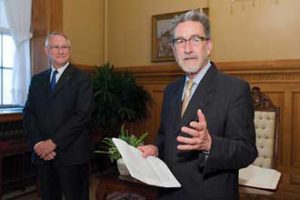
By Pascal Zamprelli
“This is a historic moment,” Mayor of Montreal Gérald Tremblay said earlier this month as he addressed a crowd gathered at City Hall that included the consuls-general from Egypt, Iraq, Lebanon, Morocco and Syria. “One day people will realize the significance of the efforts undertaken to better understand the citizens of the world. Our Charter is universal.”
The Mayor was referring to one of the projects about which he has been most passionate since assuming office: the 2005 Montreal Charter of Rights and Responsibilities, a groundbreaking document in that it represents the first time a municipality has so ambitiously codified the “deal,” so to speak, between the City’s government and its citizens.
But to the Mayor, it’s more than that. He sees the document not only as one that can create civic peace at home, but also as a model to be shared with the other multicultural metropolises of the world. His excitement was palpable on this night, as he received the official Arabic translation of the Charter.
“It is these values, based on inclusion and respect for diversity, that we wish to share, thanks to the Charter, with the Arabic-speaking cities of the world, in a spirit of openness, dialogue, and rapprochement,” he said. It is Tremblay’s belief that sharing Montreal’s Charter can contribute to world peace, so making it accessible to all is no minor endeavour in his eyes.
But of course, the Charter did not translate itself – Tremblay needed some help for that part. “I had to find the right person,” he said, “but that was easy. I’d already found him, and the right university.”
Bringing McGill on board
The right person was James Archibald, Director of Translation Studies at McGill’s Centre for Continuing Education. Indeed, students in his department’s trilingual program successfully translated the Charter into Spanish last year. Archibald had seen the Spanish project as a perfect fit for McGill, and was eager to pursue that connection with the City and get on board for the Arabic version.
“This link with McGill represents a Montreal dynamic that harkens back to the Universal Declaration of Human Rights,” Archibald said during his own remarks. “Today, we are proud, through this work, to keep alive this tradition of community engagement and collective defense of human rights.”
The Charter and its translations represent Montreal’s openness to the world and its commitment to cultural diversity, he said, notions also of central importance to universities.
To accomplish the translation, Archibald worked with a team from L’Université Libanaise in Beirut as well as a collection of students, citizens and government officials here in Montreal. The team was diverse by necessity, ensuring that every possible interpretation and nuance of every translated word was carefully considered.
The Lebanese students involved in the project faced some intriguing conundrums. What of the guiding word “reasonable,” for example? What is reasonable in Montreal may not be reasonable in Beirut, Archibald noted. And not only is there no Arabic word for “ombudsman,” but students found the very concept to be alien to Middle Eastern culture.
But after much hard work and countless revisions, the result is a document Montreal can be proud to share with its Arabic-speaking citizens, and with the larger Arab world. “The Charter is an example to show world’s major Arabic-speaking cities that we can all live together after all,” Archibald said, pointing to the shared values enshrined in it, such as equality, justice, tolerance, inclusion, respect for human dignity, and peace.
“It might seem Utopian,” he said, before smiling at the mayor and adding, “but if there were no Utopians like you and me, we’d be lost.”
Up next: Mandarin
It was at the end of a similar ceremony celebrating the Spanish translation that Archibald and Tremblay quietly agreed to proceed with an Arabic version. This time, the jubilant Mayor could not help telling everyone what he and Archibald had planned in their efforts to share Montreal’s experiment in participatory democracy with the world: next up, translating the Charter into Mandarin.
To view the Charter in its original and translated versions, please visit the City of Montreal website at http://ville.montreal.qc.ca
